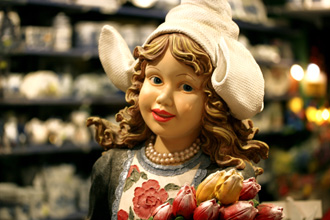 Transformation of the Flower Children
Transformation of the Flower Children
Writer Abigail R. Esman '82 reflects on how terrorism has embittered Dutch society, as Western Europe wrestles with the rise of radical Islam
Journalist and essayist Abigail Esman '82 has written extensively about the rise of radical Islam in Europe, especially in the Netherlands, where she has lived since 1990. Islamic groups espousing terrorism pose multiple challenges to the West, she feels. Not only is there the danger of actual attacks, such as the murder of outspoken Dutch filmmaker Theo van Gogh in 2004, as well as the bombings in Madrid and London. But, she argues, by exploiting Western fears as well as Western tolerance, Islamic militants are forcing European countries to compromise fundamental values such as free speech and equal rights for women. European governments further erode those values through overly repressive responses to the threat of terrorism, she says. Esman writes a monthly column for the Web magazine World Defense Review and has also written for the Christian Science Monitor, the New Republic, and Salon.com. In 2002, she won the silver medal in the prestigious Shell/Economist essay competition.
In the Dutch Muslim community, are violent groups popular or marginal?
Neither and both. For the most part, Muslims in the Netherlands are against the use of violence, but they sympathize with and understand those who promote it. The idea that "Theo asked for it" was pretty standard in the Muslim community, because van Gogh had said all kinds of unkind things about Muslims.
Have anti-terrorism measures been controversial in this famously open society?
Few anti-terrorism measures have produced much of an outcry, because, despite appearances to the contrary, Holland has been something of a police state for ages. Officials have openly listened in on private phone conversations for as long as I can recall. When you move, you register with the city, so they know who lives where and how many homes that person has. Before the murder of Theo van Gogh, the thought that an actual terrorist attack would take place on their soil was inconceivable to the Dutch. As controversial as he was, van Gogh was nonetheless much loved as an emblem of the country and its culture. The anger after his murder remains palpable. So the sense has been, basically, do "whatever it takes" to stop terrorism. By contrast, all efforts to create a feeling of hospitality, to reformulate Dutch culture to accommodate Muslim beliefs, while popular pre-9/11, find very little support now.
Has Dutch society changed because of the challenges posed by terrorism, immigration, and conflicts related to religion?
The society has changed enormously. Pre-9/11, I was convinced that Holland was perfect. Now, when people talk about the damage to civil liberties in America, I say, "Try Holland." Amsterdam, once a city of flowers and flower children, where people whistled "Für Elise" while riding their bicycles home at night, is now a tense, angry, suspicious, unkind city. There's practically an apartheid in place between the Dutch and in particular the Moroccan community. It's completely the opposite of what happened in New York after 9/11, when we all came together and literally cried on strangers' shoulders. Americans came together against a force we viewed as being "outside." In Holland, that force is not outside. The most radicalized Muslims are the ones who are born and raised here. They've thrived because of Holland's efforts to be open and accepting of all things, including the most unacceptable of behaviors. "Tolerance" allowed the Dutch to tolerate abuse in Muslim homes because not to do so would be seen as religious intolerance. It allowed radical imams to preach in local mosques, to distribute literature, and so on.
You have written about how radical Islam in Europe challenges traditional democratic values. How are the Dutch handling this challenge?
The problem essentially is one of pitting freedom against respect on the one hand, and against fear on the other. Comedians won't tell jokes that involve even the merest mention of Islam. People sit silent. Or they become politically correct to the point of blindness, as was the case in regard to honor killings and domestic abuse in Dutch Muslim homes, things that were waved away out of "respect for the culture." One now faces questions of whether things previously accepted in Dutch culture should be banned because Muslims don't like them, gay marriage being a particularly hot item.
On the other hand, you've got former immigration minister Rita Verdonk, who came up with the notion of banning all languages besides Dutch from the public space. This was obviously meant to discourage Arabic and force Muslim immigrants to learn Dutch--and make it easier for the secret service to listen in on conversations, of course. But in practice, it would have meant that if you came to visit me, we would not be able to converse on the street or in a restaurant in English. Unsurprisingly, the idea was laughed off the table, but it gives you an idea of what the Dutch are wrestling with.
To what extent has anti-Muslim discrimination contributed to the rise of radical Islamic groups?
Much less than people like to claim. That's a fable that irritates me enormously. Poverty may exacerbate the situation, but the fact is that jihad and Islamic militancy are religious, not sociopolitical movements. The highest-ranking terrorists in the Netherlands are from middle-class families. They were well-educated. And they themselves have said that their actions are about Allah and Islam. Period. I find it crucial that we get beyond the idea that Islamic terrorism is about discrimination and poverty, and recognize it for what it really is.
Do you have feedback on this page?
